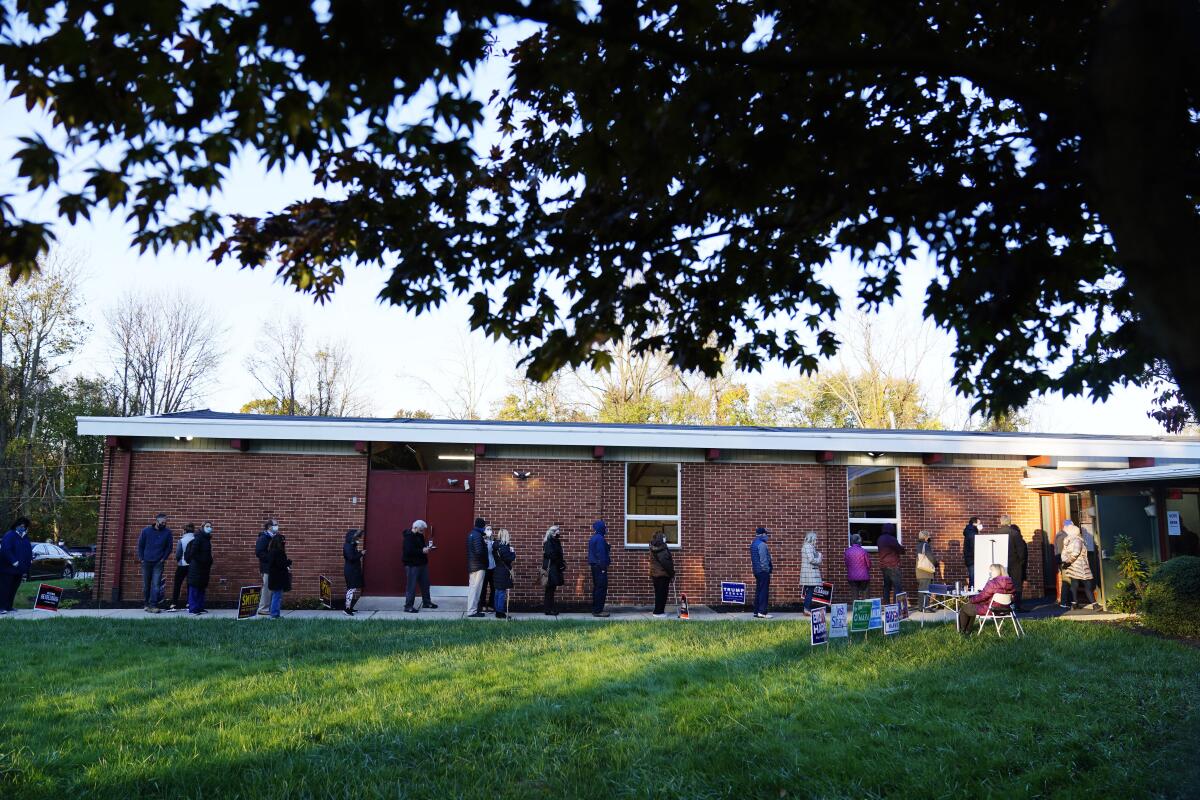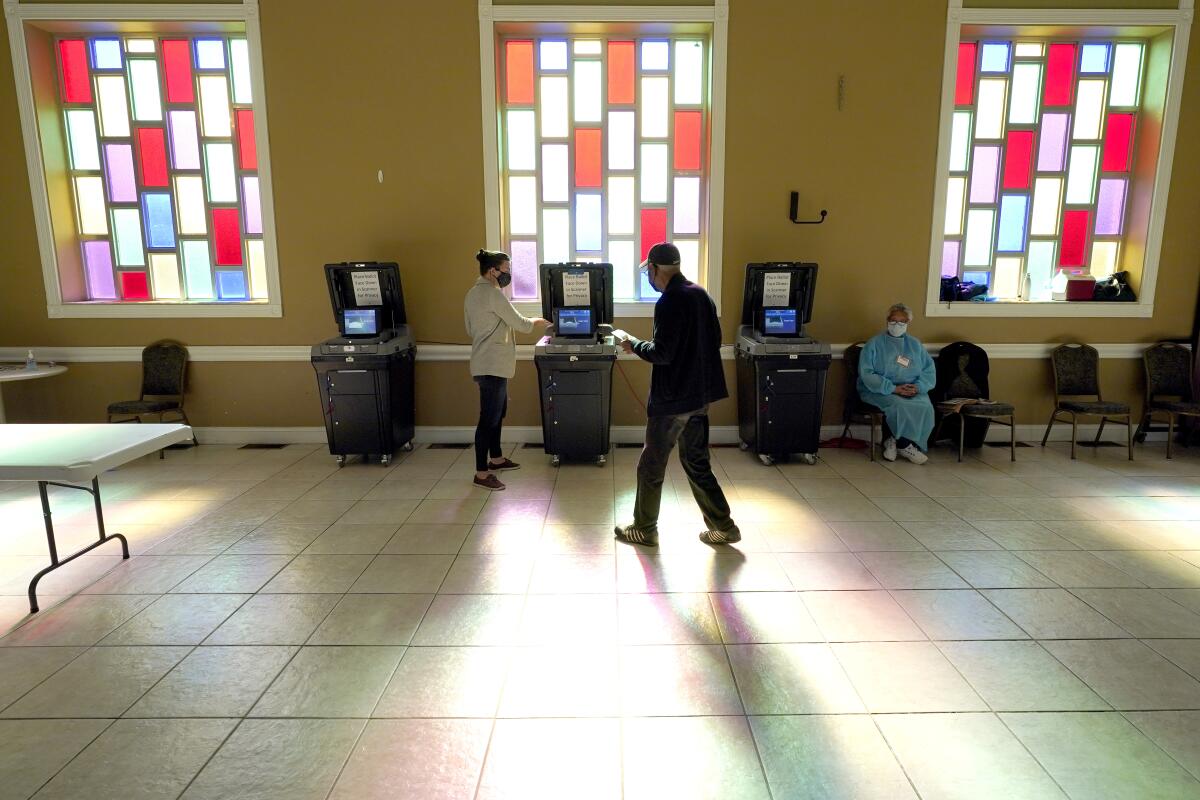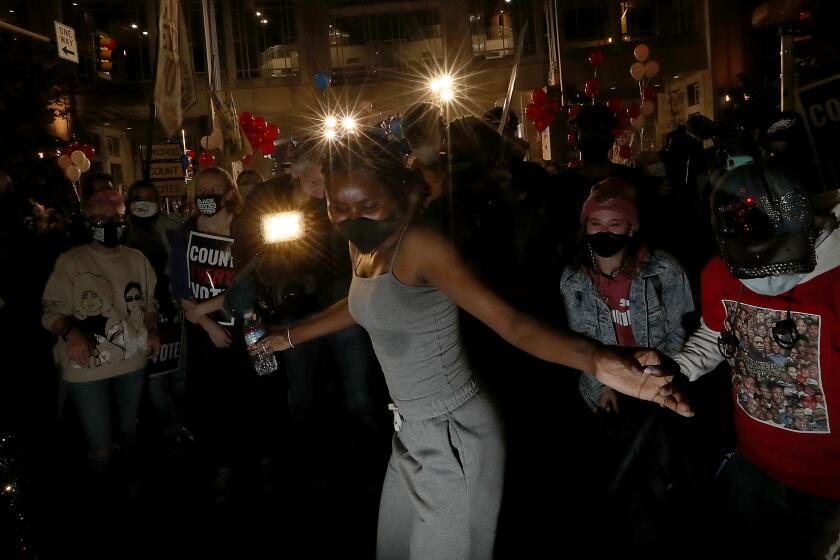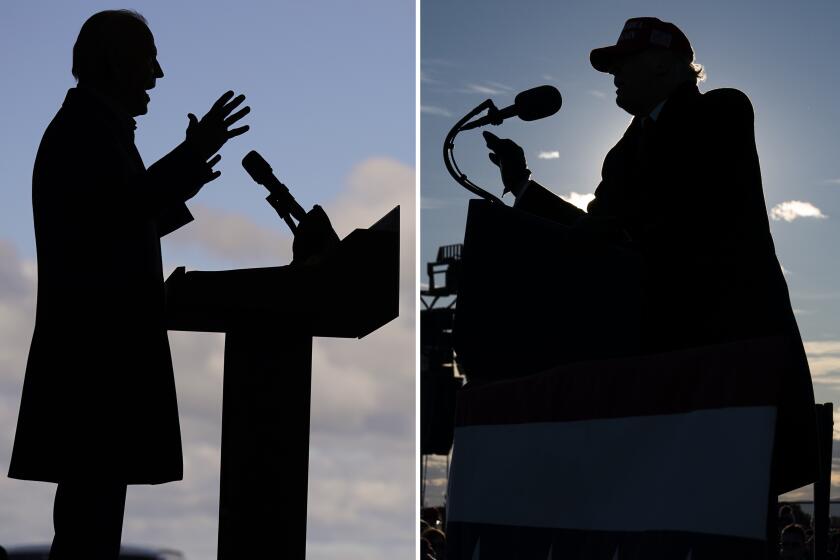Election 2020: Amid high anxiety, voting systems proved resilient

All across the country, Los Angeles Times reporters spoke with voters — both Biden and Trump supporters — at the polls. Here’s a snapshot of voting day from Phoenix to Orlando.
- Share via
DETROIT — In an election unlike any other, the most remarkable thing may have been how unremarkable voting was.
Fears that militias would block entrances to polling places or armed, self-deputized poll watchers would intimidate voters did not materialize. The disruptions that did emerge were routine for a major election: election machine glitches, activist skirmishes and a spate of misleading robocalls and texts.
It was welcome news as the president continued to make unsubstantiated claims of a conspiracy to steal the election and put the nation on edge with his suggestion that he may try to declare victory before millions of votes are counted.
Even though voting ran smoothly in many places, nerves remained frayed throughout the day. Businesses from Beverly Hills to Washington, D.C., braced for protests, boarding their windows with plywood.
The U.S. Postal Service was ordered by a federal judge to sweep facilities in several states for outstanding ballots in response to the revelation that 300,000 mail-in ballots had been sent by voters but had not been recorded as received in election offices. It was unclear if the ballots were found.
Battered by the deadly coronavirus crisis, struggling with an economic recession and facing the possibility of a contested election result, voters were on track to turn out in unprecedented numbers.
They were serenaded by a bluegrass band outside a library in Phoenix, breezed through polling places with only a few minutes’ wait in Georgia and bundled up for warmth in line in Philadelphia. Poll workers in El Paso, Texas, which is suffering from one of the country’s worst coronavirus outbreaks, squirted antibacterial gel into people’s hands.
Photos: Election day voting is over but the counting continues.
More than 101 million people voted before Tuesday, according to the United States Election Project, reflecting an intense focus on this year’s campaign and the expanded use of mail ballots to avoid crowded polling places.
President Trump and Joe Biden battled into Wednesday morning with no clear winner, as major contests remained too close. Biden urged patience, while Trump called the election into question.
Amid peaceful voting, there were patches of tension. Police officers responded to the Metropolitan Multi-Service Center polling place in Houston, where supporters of President Trump and those of Joe Biden repeatedly clashed.
At dusk, Jose Casares, a 32-year-old Amazon warehouse worker, brought his Trump flag across the street to confront the Biden supporters. Police escorted him back to the Trump side as Biden supporters chanted, “Send him back!”
Casares described himself as a Christian and former Democrat inspired by Trump’s defiance of COVID-19 lockdowns that closed churches.
At a church in Philadelphia’s Germantown neighborhood, Anthony Thomas, 51, cast his ballot for Biden.
“We need somebody in power to take this [virus] seriously, because the numbers are going up,” said Thomas, adding that he has lost close friends to COVID-19.

Graham, N.C., where voters marching to the polls Saturday were met with pepper spray and multiple arrests by the police, was again the scene of a march on election day.
As night fell in the town square around the courthouse where the march ended, the multiracial coalition chanted, sang and prayed. The mood was exuberant, but there was an edge of unease to the proceedings, as Trump supporters drove past, some of them yelling out car windows.
“It was just a water bottle!” one march leader yelled to the crowd in relief after a car ran over the bottle, setting off a gunshot-like bang.
In North Carolina, Georgia and Nevada, glitches at a few polling stations resulted in extended voting hours.
Meanwhile, misinformation about voting appeared to be an ongoing issue. Anonymous phone calls and texts aimed to mislead — including calls telling voters to “stay home and stay safe” — were reported in Nebraska, Iowa, Kansas, North Carolina, Virginia and Michigan. Law enforcement officials said such low-tech efforts at voter suppression are not unique to this election.
Mail voting also presented some hurdles. Lisa Random, 50, went to the city clerk’s office in Detroit when she learned that she had forgotten to sign her ballot before sending it in. She ultimately was able to vote.
Tuesday marks the end of a tumultuous Trump and Biden race. It’s unclear when the results will be known.
In Wisconsin, officials in the Milwaukee suburb of Franklin said they had received 16,000 mail ballots by Tuesday morning, and only six were in danger of not being counted. Three hundred ballots had arrived without signatures or other required information, but the problems were fixed after workers called the voters and gave them an opportunity to “cure” their ballots.
“People go through a lot to vote and to make sure their votes count,” said Sandi Wesolowski, the city clerk. “We want to make sure all their votes count.”

The potential for courtroom challenges cast a shadow over the voting process.
In the county surrounding Houston, the third-largest in the country and a Democratic stronghold, all but one of 10 drive-through voting locations were closed by the county clerk late Monday.
Galen Pineda, 27, of Houston, has been working two jobs during the pandemic to make ends meet and had never voted before Tuesday. Her father, a legal resident from Mexico who isn’t a citizen, and the woman she babysits for, also an immigrant, urged her to head to the polls.
“I feel like my vote counts as their vote,” she said afterward. She voted for Biden, she said, because “I’m just tired of everything Trump has to say.”
Even as America’s election systems proved surprisingly resilient against the challenges of the pandemic and Trump’s efforts to discredit them, voters still worried about what happens next.
Lensa Jeudy, 30, a Florida State University graduate student who voted for Biden, said her biggest worry is that Trump supporters would not accept a Biden win.
“I’m more nervous about how people will react to that more than anything,” she said. “They’re very unpredictable, and I think that’s scary.”
Times staff writers Janet Hook, Molly O’Toole and Noah Bierman in Washington; Kurtis Lee in Detroit; Molly Hennessy-Fiske in Houston; Jim Rainey in Milwaukee; Michael Finnegan in Philadelphia; Kate Linthicum in El Paso; Brittny Mejia in Las Vegas; Jenny Jarvie in Atlanta; Tyrone Beason in Phoenix; Melissa Gomez in Tallahassee, Fla.; Arit John in Miami; Johana Bhuiyan in New York; Jaweed Kaleem in Orlando; and Brian Contreras in Raleigh also contributed to this report.
More to Read
Get the L.A. Times Politics newsletter
Deeply reported insights into legislation, politics and policy from Sacramento, Washington and beyond. In your inbox three times per week.
You may occasionally receive promotional content from the Los Angeles Times.















